Violin virtuoso Arthur Williams (Clarence Muse) is so proud to have been able to perform for a packed house within the African American community. To perform for & receive such warm reception from "my people" is more rewarding to him than to play for all the broader world.
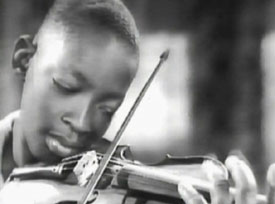 On the cusp of world success he is injured in a car accident & his arm & hand are broken. When the bones have knit, it's discovered he has nerve damage & cannot fully open his hand. He is the first of the film's simultaneously literal & symbolic Broken Strings (1940). On the cusp of world success he is injured in a car accident & his arm & hand are broken. When the bones have knit, it's discovered he has nerve damage & cannot fully open his hand. He is the first of the film's simultaneously literal & symbolic Broken Strings (1940).
With a paralyzed hand he has no choice but to put his dreams into his talented son Johnny (William Washington). But he cannot stand that Johnny wants to play swing. With his bad temper since losing his own dream, he comes down hard on the boy's jazz interests, to the point of actual abuse.
He's also abusive to the lackluster students he has taken in to try to make a little money for him & his two children to get by. Eventually he loses all his clients except young Dickey (Stymie Beard), who is something of a social rival or nemesis for Johnny, though only half as talented on the violin.
The real breadwinner of the household is Arthur's eldest child, Grace (Sybil Lewis), who is being sexually harassed at her job. When her boss learns she's engaged to another man in the company, he tries to frame the guy as a thief, then fires him, & tells Grace that if she doesn't like it she can quit too. Which she does, though it's the worst possible timing for unemployment.
Grace had taken her father to a neurology specialist (Jess Lee Brooks) who was willing to wave his surgical fee to operate on Arthur's paralysed hand, but they nevertheless had to come up with $500 for the hospital's fees. The family is as broke as can be. So Johnny, assisted by the equally young piano accompanyist Mary (Tommiwitta Moore), finagle a job at a local jazz club, despite their age. They start saving up their earnings for Johnny's dad's hand operation.
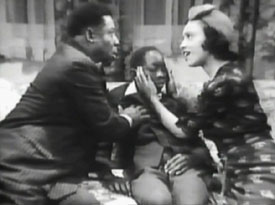 Tommiwitta Moore, afterward Tommie Moore, like everyone cast in this story, is a talented actor. She looks about thirteen or fourteen, but in fact she's twenty-three. She appeared in a very few films & television shows into the 1950s, but I have to assume she had a more dynamic stage career, as it would be just too tragic if there was nowhere for her talent. Tommiwitta Moore, afterward Tommie Moore, like everyone cast in this story, is a talented actor. She looks about thirteen or fourteen, but in fact she's twenty-three. She appeared in a very few films & television shows into the 1950s, but I have to assume she had a more dynamic stage career, as it would be just too tragic if there was nowhere for her talent.
Matthew "Stymie" Beard as Dickey also does a great job. He'll always be remembered for his performances in the "Little Rascals" films from 1930 to 1935. He's just old enough in Broken Strings that we can be assured the limitations his career met after childhood was not because he'd been sliding easily on his extreme cuteness. He really could act.
His later life on the skids & addicted to heroin has got to be at least partially due to racism in the industry & in the world, though Matthew personally never laid blame anywhere, & toward the end of his life (he only lived to age fifty-six) he toured as an educator against drug abuse.
The pure unexpected delight among the youth in the cast, though, was William Washington as the young violin prodigy. This young man had physical beauty, a smile to melt hearts, & that's really him playing the violin.
Now & then one hears a Hollywood actor even today bold enough to gripe about the racism that still limits the sorts of roles most black actors are ever going to be offered. But today's typical typecasting of black guys as pimps or as police officers is one hell of a lot more advanced than what William Washington had to put up with in order to be employed in the movies.
With all that talent, he went on from this film debut to count his blessings to have a few uncredited roles as a loinclothed native or a criminal. As a film fan I feel deprived. Racism means there are no other great film roles for William Washington for me to track down in order to see this talented young man along the years.
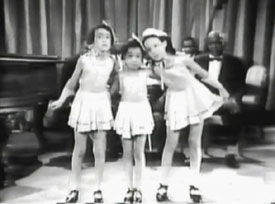 There are two plotlines in play by now, Johnny playing jazz in direct disobedience of his father's disdain for jazz, & Grace's story with her boyfriend who she would like to marry but cannot abandon her father in these days of need. There are two plotlines in play by now, Johnny playing jazz in direct disobedience of his father's disdain for jazz, & Grace's story with her boyfriend who she would like to marry but cannot abandon her father in these days of need.
There are subplots as well, the best regarding a hulking banjo player Stringbean Johnson (Darby Jones) who was present at Arthur Williams' last concert before the accident.
Stringbean adores Mr. Williams' talent & refuses to believe the great violinist will not recover the use of his hand. He credits Arthur's violin playing for some of the special techniques he has devised for his banjo, & dreams of someday having a joint performance with Arthur once the master violinist makes his come-back.
The sweetness of this banjo-pickin' giant is held in stark contrast to Arthur's sense that his classical music is the only music that is worthwhile. Eventually short-tempered Arthur becomes angry enough that his usual politeness goes out the door & he tells Stringbean to his face that being on the same stage with a banjo-picker would disgust him.
Indeed Arthur descends into near villainy yelling at the good-hearted banjo man, & severely punishing Johnny when he discovers him playing swing at a club. When he learns Johnny & Mary were trying to raise the money for his hand surgery, & that Grace had lost her job so that the kids had secretly been supporting them all, he is profoundly ashamed & apologetic for his cruel behavior. But he still won't let Johnny play jazz.
A lot of the "race movies" of the era did not have great stories & sometimes only had enough story to support musical numbers. I'd say three-quarters of these films or more are most praiseworthy for the amazing musical talent, but you gotta overlook the stories, & be forgiving of the acting as well. Broken Strings however has dramatic power, is well acted throughout, & is not simply an excuse for the music.
Which is not to say the music is unimportant. Eventually the film does put on a musical showm without for a moment losing its dramatic strength. Johnny signs up for a radio amateur show with a $250 first prize. He won't play his jazz as he doesn't want to disobey his father again, but he's awfully good at classical too.
On the day of the show, his sister, father, and a small studio audience, are present. The first act up is not one of the amateurs, but the show's host, Elliott Carpenter, who was the guy who dubbed in Dooley Wilson's piano playing throughout Cassablanca (1942).
Elliott gives a little lecture illuminated by his piano playing, comparing classical music to swing jazz. It's almost like he was addressing it directly to Arthur Williams who wrongly deplores jazz. He then introduces the first contestants, a sweet trio of little girls, the Stevens Sisters, Charmaine, Cecile, & Leonetti.
With Elliot at piano, the girls sing a couple lines of the Adam Geibel & Richard Buck composition "Kentucky Babe." Though cute they're not brilliant singers for their age. They then take to tapdancing to "Ain't She Sweet" & really they are quite thrilling dancers, talented enough one might expect their career to last into adulthood, though they seem to have faded away never again to be seen on film.
That giant of a banjo player Stringbean Johnson is up next, who we'd earlier seen doing a "rubber legs" tap routine for humor sake, snake-leg dancing having been performed around Harlem sicne the ragtime era. He's been so endearing throughout the film that it's actually something of a preliminary story climax to finally get to see him play his banjo.
First there's some "giant guy" and "short guy" schtick between him & Elliot Carpenter, then he seats himself to play a classical violin piece on his banjo, an arrangement that came to him that day he saw Arthur Williams' last concert performance.
Darby Jones, who in every scene where in plays "the gentle giant," does so with profound charm, with real humor, & a big dose of human decency as big as himself. Because Darby was such a tall fellow, he wasn't one of the sorts of black actors stuck playing exclusively porters & shoeshine boys. No, a guy that big had to be given a goofy jungle outfit to be typecast as tribal chiefs in jungle picture after jungle picture.
Forgive my tirades along the way, but just think how frustrating these limitations must've been to actors with a more varied talent than Hollywood cared to know about. Now I love jungle pictures, even the cheap & cheezy ones, & I'd in no way say such foolish stuff shouldn't've been done at all.
Yet here's a guy I would've given starring vehicles if I'd been producing films way back when, yet all I can ever hope to see him in besides Broken Strings will have to be Darby Jones as jungle chief or witch doctor, roles that most of the time didn't even garner him a screen credit. Unfair Local Twelve!
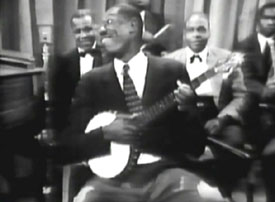 Even now, after Stringbean's homage performance, Arthur's cold heart against jazz is unmelted & he whispers to Grace something rude about the banjo take on classical. Even now, after Stringbean's homage performance, Arthur's cold heart against jazz is unmelted & he whispers to Grace something rude about the banjo take on classical.
Next at the radio microphone is Dickey Morley, Johnny's rival, who does an okay job on classical violin, nothing of genius, but no embarrassment.
He afterward sneaks around to damage the strings on Johnny's violin, to insure his own violin performance is best, & there'll later be a closing scene in which Dickey apologizes with such sincerity that it's easy for Johnny to forgive him.
When Johnny begins, accompanied by Mary at piano, they are humiliated when a violin string breaks. Johnny tries to adapt the classical piece to the remaining strings, but a second string breaks, so now it's useless, & unfortunatey the small audience laughed as though they thought it was part of a comedy act.
So Johnny gives Mary a knowing look, & as there's no other recourse, they leap into a splendid swing version of the classical number, very beautiful, & Elliott Carpenter's orchestra joins in man by man until it's a superb finale, absolutely fabulous.
When the audience was laughing, a tragic-visaged Arthur was deeply moved & sorrowed by his son's humiliation. But then seeing his son pull success out of defeat! In that moment, Arthur at last became a jazz fan!
And when the audience claps with wild enthusiasm, so does Arthur, whose paralyzed hand is jarred into functionalilty, so that he'll be able to close the film praising Johnny's peformance & praising jazz for curing his injured hand. A trifle corny but I liked it.
I truly love this movie. Many old black-cast films don't survive at all, so we have to be forgiving of the horrible condition of the print that came down to us. It's such a good film it merits some expensive restoration, but the damage is pretty extensive & could never be rendered perfect.
Even in its terribly damaged state, however, the film has power & beauty, representing the triumph of the African American spirit, to create a film of such humanity & strength with limited resources completely outside the Hollywood system, at a time when Hollywood just couldn't bring itself to provide such wonderful depictions of daily life in black America.
copyright © by Paghat the Ratgirl
|
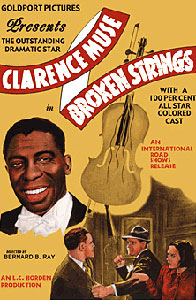
 On the cusp of world success he is injured in a car accident & his arm & hand are broken. When the bones have knit, it's discovered he has nerve damage & cannot fully open his hand. He is the first of the film's simultaneously literal & symbolic Broken Strings (1940).
On the cusp of world success he is injured in a car accident & his arm & hand are broken. When the bones have knit, it's discovered he has nerve damage & cannot fully open his hand. He is the first of the film's simultaneously literal & symbolic Broken Strings (1940). Tommiwitta Moore, afterward Tommie Moore, like everyone cast in this story, is a talented actor. She looks about thirteen or fourteen, but in fact she's twenty-three. She appeared in a very few films & television shows into the 1950s, but I have to assume she had a more dynamic stage career, as it would be just too tragic if there was nowhere for her talent.
Tommiwitta Moore, afterward Tommie Moore, like everyone cast in this story, is a talented actor. She looks about thirteen or fourteen, but in fact she's twenty-three. She appeared in a very few films & television shows into the 1950s, but I have to assume she had a more dynamic stage career, as it would be just too tragic if there was nowhere for her talent.
